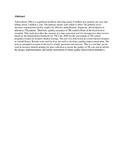| dc.contributor.author | Billingsleya, Katherine McQuade | |
| dc.contributor.author | Smith, Nathaniel | |
| dc.contributor.author | Achieng, Loice | |
| dc.contributor.author | Shirley, Rhett | |
| dc.contributor.author | Keiser, Philip | |
| dc.date.accessioned | 2013-06-20T08:25:44Z | |
| dc.date.available | 2013-06-20T08:25:44Z | |
| dc.date.issued | 2011 | |
| dc.identifier.citation | Volume 91, Supplement 1, December 2011, Pages S49–S53 | en |
| dc.identifier.uri | http://www.sciencedirect.com/science/article/pii/S1472979211001806 | |
| dc.identifier.uri | http://erepository.uonbi.ac.ke:8080/xmlui/handle/123456789/36634 | |
| dc.description.abstract | Tuberculosis (TB) is a significant problem, infecting nearly 9 million new patients per year and killing about 2 million a year. The primary means with which to affect TB globally are to decrease transmission locally, mainly by effective identification, diagnosis, and treatment of infectious TB patients. Therefore, quality assurance of TB control efforts at the local level is essential. This study describes the creation of a data extraction tool for retrospective chart review based on the International Standards for TB Care, 2009 for the assessment of TB control programs located in resource limited settings. The tool was field tested at a rural mission hospital in central Kenya. Results were used by host site staff to develop a quality improvement plan. The process prompted revision of the tool to clarify questions and answers. This is a tool that can be used in resource limited settings for data collection to assess the quality of TB care and to inform the design, implementation, and further assessment of future quality improvement initiatives. | en |
| dc.language.iso | en | en |
| dc.title | A quality assessment tool for tuberculosis control activities in resource limited settings | en |
| dc.type | Article | en |
| local.publisher | College of Physical and Biological Sciences | en |

